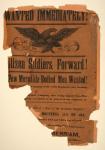
Cumberland Civil War bounties, 1864
Town of Cumberland
Text by Candace Kanes
Images from Maine Historical Society, Aroostook County Historical and Art Museum, Baldwin Historical Society, Town of Cumberland, Cary Library
Maine contributed more soldiers per capita than any other state to the Union Army during the Civil War.
That simple and impressive fact, however, hides the reality of how men and boys came to become soldiers.
Some signed up because of patriotic impulses or, as John G. Dillingham of Freeport, age 18, stated, "when I think of those d md secesionists it get my temper up and I get warmed up with it." He joined the Navy and died in Andersonville prison.

Draft for town of Baldwin's Civil War bounty certificates, 1863
Baldwin Historical Society
In contrast, Theodore Cary of Houlton paid $300 to Richard C. Fulton to take Cary's place in the military. Fulton, the substitute, died Nov. 24, 1863.
Even though there had been plenty of willing volunteers early on in the war, filling the ranks of the Union forces became increasingly difficult as the war continued and casualties mounted. The Confederate Army had a similar problem and instituted a draft in 1862.
Soon, the U.S. government called for more volunteers, followed by a Militia Act that required men from 18 to 45 to be in a state militia – and paid those entering the service $25.
Threatening to have a draft, apparently, was enough to prompt more enlistments.

Civil War bounty receipt, Houlton, 1864
Cary Library
In March 1863, the government passed the Enrollment Act that required men between 20 and 45 to serve for three years – the first U.S. draft. Each state or town had a quota to fill, based on the number of residents
Those rules, however, could be skirted. Certain occupations were exempt and men could pay a substitute to serve or pay the government $300. The policy led to bounty jumpers, who agreed to serve, then deserted, often to agree again and get another payment, and to resentment of poorer men who had to serve while wealthier ones could get out of the obligation.

18th Regiment recruiting poster, Aroostook County, 1862
Aroostook County Historical and Art Museum
In addition, volunteers were paid bounties of $300, usually not in a lump sum, and sometimes promised money and land when they returned from war.
The Town of Cumberland, for instance, voted on July 30, 1863 to pay $300 to any drafted soldier. The men could keep the money and serve, use the money to hire a substitute, or return the money and "stay at home."

Draft for town of Baldwin's Civil War bounty certificates, 1863
Baldwin Historical Society
In 1864, the town compiled a list of men who were paid "for the purpose of filling the quota of the town of Cumberland." If drafted, they would not get any of the money.
Substitutes were needed not just because men did not want to serve, but because towns suffered when all the young men, needed to take care of various town and business functions, were gone.
But the bounty and substitute system created at least as many problems as it solved and by the next major war -- World War I -- it was banned.
















